Definition of Noun:
A noun is a fundamental element of speech that typically serves as the subject or object in a sentence. It denotes a person, place, thing, idea, or event.
Noun and Its Types with Examples
In English grammar, a noun is a word that refers to a person, place, thing, idea, or event. Here are the types of nouns with examples:
Common Nouns
Common nouns denote general items rather than specific ones and are not capitalized unless they start a sentence.
Examples:
- The teacher gave a challenging assignment.
- A city lights up beautifully at night.
- She bought a new car.
- His quest for happiness led him to travel.
- The dog barked loudly at the strangers.
- We decided to try the new restaurant
- They hiked up the steep mountain.
- She listens to classical music to relax.
- He wrote a 300-page book.
- Playing chess is his favorite game.
- The river flowed gently through the valley.
- He ordered a cup of strong coffee.
- Advancements in technology have made life easier.
- The flower in her hair was captivating.
- Eating fresh fruit is good for health.
- A colorful bird landed on the windowsill.
- We spent the day at the sunny beach.
- There is a variety of food at the festival.
- The school is hosting a charity event.
- Their team won the championship.
Proper Nouns
Proper nouns are specific names given to particular people, places, or institutions and are always capitalized.
Examples:
- Elizabeth is planning to study law.
- Paris is known as the City of Light.
- The car is a Toyota.
- Christmas is my favorite holiday.
- The Amazon River is the second longest in the world.
- Many people use Google for online search.
- Monday is the first day of the workweek.
- The Statue of Liberty is an iconic monument.
- Africa is rich in cultural heritage.
- Jupiter is the largest planet in our solar system.
- Harry Potter is a popular book series.
- Climbers come from around the world to scale Mount Everest.
- The Beatles revolutionized rock music.
- New York is bustling with life.
- The White House is the residence of the U.S. president.
- Hinduism is one of the oldest religions.
- January marks the beginning of the year.
- Starbucks is a popular coffeehouse chain.
- Wall Street is synonymous with the finance industry.
- Shakespeare is regarded as one of the greatest writers in English literature.
Must Learn About:
Nouns, Pronouns, Verbs, Adjectives, Adverbs, Interjections, Prepositions, Conjunctions
Abstract Nouns
Abstract nouns signify intangible concepts, ideas, or qualities that cannot be touched or seen.
Examples:
- Love knows no boundaries.
- She values her freedom above all else.
- The beauty of the scene left us breathless.
- He demonstrated great strength of character.
- Her anger was evident in her clenched fists.
- Seeking knowledge is a noble pursuit.
- It took bravery to stand up to the bullies.
- She is known for her wisdom and insight.
- They respected her commitment to the truth.
- His patience with young learners is admirable.
- Her youth was full of adventures.
- The judge is a symbol of justice.
- Overcoming his fear was a pivotal moment.
- Their happiness was contagious.
- The treaty brought peace to the region.
- She exudes confidence when she speaks.
- The organization is known for its charity
- Embracing culture enriches lives.
- Preserving one’s memory can be challenging with age.
- His faith sustained him during difficult times.
Concrete Nouns
Concrete nouns represent objects that can be experienced through the senses.
Examples:
- He bit into a crisp apple.
- The sound of the drum echoed in the hall.
- Her perfume filled the room with a sweet scent.
- The velvet dress was soft to the touch.
- The thunder startled us during the storm.
- He savored the rich taste of chocolate.
- The puppy‘s fur was incredibly soft.
- The siren of the ambulance was deafening.
- She received a rose on Valentine’s Day.
- For lunch, I had a ham and cheese sandwich.
- The ocean waves were calming to watch.
- He played a tune on the grand piano.
- We watched the sunset over the horizon.
- The fireworks lit up the night sky.
- The painting sold for a million dollars.
- Everyone enjoyed the ice cream at the party.
- The referee blew the whistle to stop the game.
- The diamond sparkled under the display lights.
- The ancient moss covered the entire forest floor.
- She ordered a hamburger without onions.
Must Learn: Parts of Speech
Countable Nouns
Countable nouns can be individually counted and have both singular and plural forms.
Examples:
- The cat sleeps on the windowsill.
- She had a brilliant idea for her science project.
- Please recycle the empty bottle.
- I found a dollar on the ground.
- His desk is always neat and organized.
- She peeled a banana for breakfast.
- We’re expecting several guests
- He told a funny joke that made everyone laugh.
- The window was left open all night.
- The beach was crowded with tourists.
- The child flew a kite in the open field.
- I’d like a chocolate chip cupcake, please.
- The sky was dotted with twinkling stars.
- She tossed a coin into the fountain.
- He wrote his notes in a spiral notebook.
- A child‘s laughter is very heartwarming.
- He picked a ripe berry from the bush.
- Our new neighbor is very friendly.
- She stirred her tea with a small spoon.
- The puzzle had a thousand pieces.
Uncountable Nouns
Uncountable nouns cannot be counted because they represent a mass or collection of something.
Examples:
- You need to drink more water.
- The children played in the sand.
- He added some rice to the boiling water.
- Her love for music was evident.
- The report contained important information.
- Freshly baked bread smells wonderful.
- She gave me some valuable advice.
- He carried his luggage to the car.
- Her jewelry was tastefully chosen.
- Doing homework is a nightly routine for students.
- The room was filled with stylish furniture.
- The blackout caused by the storm cut off all electricity.
- The sweater was made of 100% cotton.
- The room was in complete chaos after the party.
- His artwork is displayed in a local gallery.
- She updated her computer’s hardware.
- The detective looked for evidence at the scene.
- The air was fresh after the rain.
- His honesty won him many friends.
- Preserving our heritage is essential for future generations.
Collective Nouns
Collective nouns refer to a group or collection of people, animals, or things.
Examples:
- The entire audience stood up to applaud.
- The church choir sang harmoniously.
- Our class decided to go on a field trip.
- The ship’s crew worked tirelessly.
- The army marched in perfect unison.
- The expert panel answered all the questions.
- A fleet of ships sailed across the ocean.
- Our family gathers for dinner every Sunday.
- The rock band played their hit song.
- A flock of birds flew south for the winter.
- The jury reached a unanimous decision.
- Their team celebrated the victory.
- The group decided to postpone the meeting.
- A pack of wolves was spotted in the forest.
- She picked a bunch of flowers from the garden.
- The board is considering new policies.
- The city council met to discuss the budget.
- The ensemble received a standing ovation.
- The company’s staff got a holiday bonus.
- The tribe held a ceremony for the harvest.
Compound Nouns
Compound nouns are made from two or more words combined to create a noun with a specific meaning.
Examples:
- Brushing twice a day with toothpaste keeps teeth healthy.
- Playing basketball is a great way to exercise.
- The sunflower turned towards the light.
- My mother-in-law has been very supportive.
- I need a haircut
- He wrote his assignment in his notebook.
- She sent the letter via the mailbox.
- The firefighter bravely entered the burning building.
- I forgot my eyeglasses at home.
- Let’s meet at the bookstore after lunch.
- She wore a stylish jumpsuit to the party.
- The baby sat in the highchair and ate.
- The moonlight shone through the window.
Plural Nouns
Plural nouns represent more than one person, place, thing, or idea.
Examples in Sentences:
- The books are on the shelf.
- All the children played in the park.
- She washed the dishes after dinner.
- Several buses were waiting at the station.
- The women attended the conference.
- The men are working on the construction site.
- The tables were set for the banquet.
- They have two cats and three dogs.
- The apples were juicy and fresh.
- The birds were chirping at dawn.
- He owns a collection of stamps.
- The factories are producing more goods.
- The beaches were crowded this summer.
- They gave us many blankets to keep warm.
- The leaves fell from the trees in autumn.
- The classes will start in September.
- The batteries need to be replaced.
- The players received their trophies.
- She tied her shoes
- The wolves howled in the distance.
Possessive Nouns
Possessive nouns show ownership or possession.
Examples in Sentences:
- The dog’s leash was pink.
- Sarah’s book is on the table.
- We went to America’s largest park.
- The teacher’s notes were detailed.
- The cat’s whiskers twitched.
- Tom’s car broke down.
- The players’ uniforms were new.
- The birds’ nest was hidden.
- She read Charlotte’s
- The children’s room was painted blue.
- The employee’s desk was tidy.
- The author’s ideas were innovative.
- Friday’s meeting was postponed.
- The guitar’s strings needed tuning.
- January’s sales exceeded expectations.
- The garden’s flowers are blooming.
- Michael’s performance was outstanding.
- The lawyer’s advice was helpful.
- Paul’s jacket was stylish.
- The phone’s screen cracked.
Material Noun
Material nouns refer to the matter or substance from which things are made.
Examples in Sentences:
- The sculpture was made of marble.
- Her necklace is pure gold.
- The window was made of glass.
- They used steel to reinforce the structure.
- The cotton shirts are very comfortable.
- Her ring is crafted from silver.
- The pipes are made of copper.
- The plastic bottles are recyclable.
- The bench was carved from oak.
- The silk dress was expensive.
- The wool sweater was itchy.
- He collected many stone
- The roof is layered with slate.
- The leather sofa was luxurious.
- She wore a ruby
- The ceramic vase was fragile.
- They built the driveway with concrete.
- The brass fixtures shone brightly.
- The linen curtains were airy and light.
- The diamond sparkled under the light.
Nouns as Objects
Nouns can function as objects in a sentence, meaning they receive a verb’s action.
Examples in Sentences:
- She baked a delicious cake.
- The student answered the difficult question.
- He threw the ball to his friend.
- She wrote a long letter to her grandmother.
- The artist painted a beautiful landscape.
- He repaired the broken fence.
- The child held the kitten
- They boarded the massive ship.
- She cut the ribbon at the opening ceremony.
- He caught the frisbee
- The gardener watered the plants.
- She played a tune on the piano.
- The chef seasoned the steak
- He polished his shoes until they shone.
- The tourists visited the ancient ruins.
- She lost her earrings at the beach.
- The mechanic inspected the engine.
- He ordered a sandwich for lunch.
- She arranged the flowers in a vase.
- They lifted the heavy box
100 Examples of Noun in sentences
- The chair was handcrafted.
- She drank a glass of water.
- He bought a new laptop.
- The moon was bright that night.
- A mouse scurried across the kitchen floor.
- She received a beautiful bracelet as a gift.
- The taxi arrived late.
- He plays the guitar very well.
- They planted an oak in their yard.
- The mirror reflected the morning light.
- The breeze felt refreshing.
- A bookcase stood in the corner.
- Her dress was a deep shade of blue.
- The pie had a flaky crust.
- His joke made everyone laugh.
- The garden was full of roses.
- She tied her hair with a ribbon.
- The map showed many hidden trails.
- He saved the document on his computer.
- The bell rang for lunch.
- A fountain stood in the center of the park.
- The photo captured their happiness.
- The statue was centuries old.
- Her notebook was covered in stickers.
- The sunflower grew taller than the fence.
- The puppy chewed on his new toy.
- A crow cawed from the treetop.
- The waiter took their order.
- The envelope was sealed tightly.
- He wore a uniform to work.
- The key unlocked the ancient door.
- The violin played a haunting melody.
- A parade marched down the street.
- She put the coin in her piggy bank.
- The pillow was soft and fluffy.
- A lighthouse stood on the cliff.
- The flag waved in the wind.
- She opened her umbrella as it started to rain.
- The ticket was expensive.
- The butterfly landed on the flower.
- He read a poem aloud.
- The squirrel collected nuts for winter.
- A spider spun its web in the corner.
- The muffin tasted sweet and moist.
- The lantern hung from a hook.
- The shovel was used for digging.
- She wore a necklace of pearls.
- The puzzle was missing a piece.
- The kettle whistled on the stove.
- A towel hung on the rack.
- The chess game was intense.
- He changed the lightbulb.
- The pebble skipped across the water.
- The scissors were sharp and new.
- The igloo stood in the snowy landscape.
- A tower rose above the city.
- The balloon floated up into the sky.
- The candle flickered in the dark.
- She dropped her watch on the floor.
- The seashell was smooth and shiny.
- The mailbox was full of letters.
- The owl hooted in the night.
- A tent was pitched in the clearing.
- The magnet stuck to the fridge.
- The thermometer showed a rise in temperature.
- A quilt covered the bed.
- The frog leapt into the pond.
- The pendant glowed with a soft light.
- He adjusted the telescope to see the stars.
- The hedge was neatly trimmed.
- A crayon rolled under the table.
- The anchor was dropped to steady the ship.
- The drawer was full of odds and ends.
- The horn blared loudly.
- The ladder reached the rooftop.
- A badge identified the officer.
- The basket was woven from reeds.
- The harmonica sounded bluesy.
- The napkin was folded into a swan.
- A hammer lay on the workbench.
- The seagull swooped down to the beach.
- A wallet was found in the cafe.
- The lemon was tart and juicy.
- The easel held a blank canvas.
- A daisy sprouted among the grass.
- The compass pointed north.
- The blanket kept them warm.
- The flashlight illuminated the path.
- The padlock secured the gate.
- A helmet was required for safety.
- The broom swept the floor clean.
- The binoculars brought the birds closer.
- A saxophone played a jazz tune.
- The apron kept her dress clean.
- The cactus thrived in the desert heat.
- The plaque bore his name.
- The loaf of bread was freshly baked.
- A glacier crept slowly through the valley.
- The fireplace crackled warmly.
- A beacon signaled to ships at sea.
Nouns Used as Different Components of a Sentence
Nouns as a Complement
- My dream is to become a lawyer.
- The biggest issue here is unemployment.
- Her choice for the evening was a gown.
- The clear winner of the contest was Michael.
- The problem was the engine.
Used as a Subject
- Technology evolves rapidly.
- The committee will meet at noon.
- Water is essential for life.
- Airplanes fly in the sky.
- Education is a fundamental right.
Nouns Used as an Object
- The toddler clung to her doll.
- We all enjoyed the concert.
- He couldn’t believe the story.
- The cat chased the laser.
- She received a letter from her friend.
Multifunctional Nouns
Nouns Used as Verbs
- I need to book my tickets.
- They will ship the order tomorrow.
- Don’t forget to lock the door.
- She can light the room with her presence.
- We hammered the point across in the meeting.
Nouns Used as Adjectives
- The bridal gown was stunning.
- He offered a sincere
- They live in a mountain
- She bought a travel insurance policy.
- He wore a vintage jacket to the party.
Noun and its Types with Examples PDF | Images
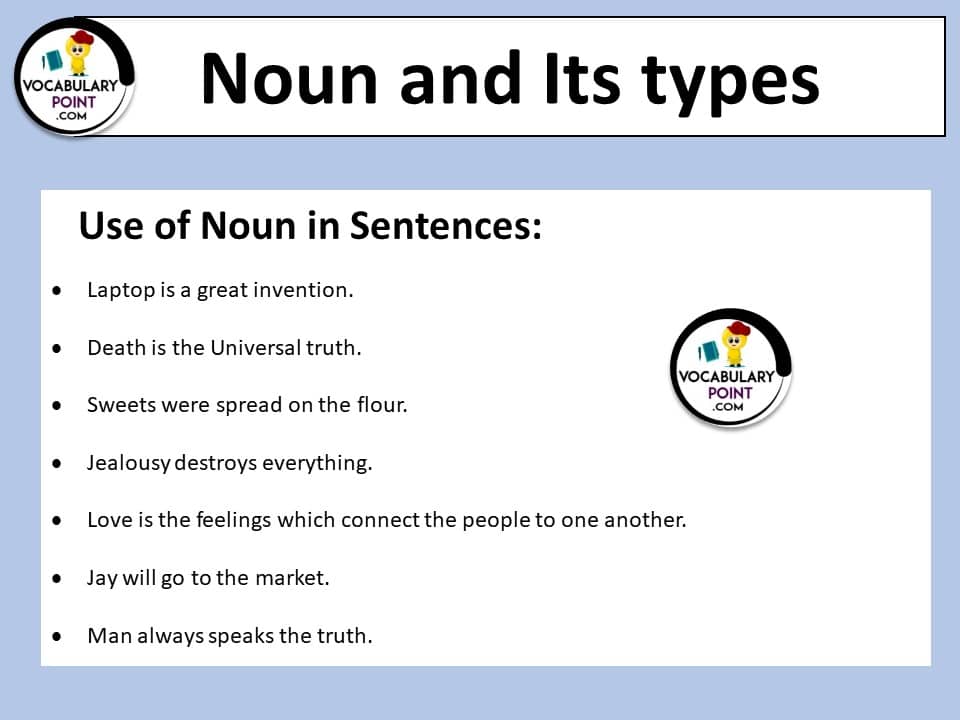
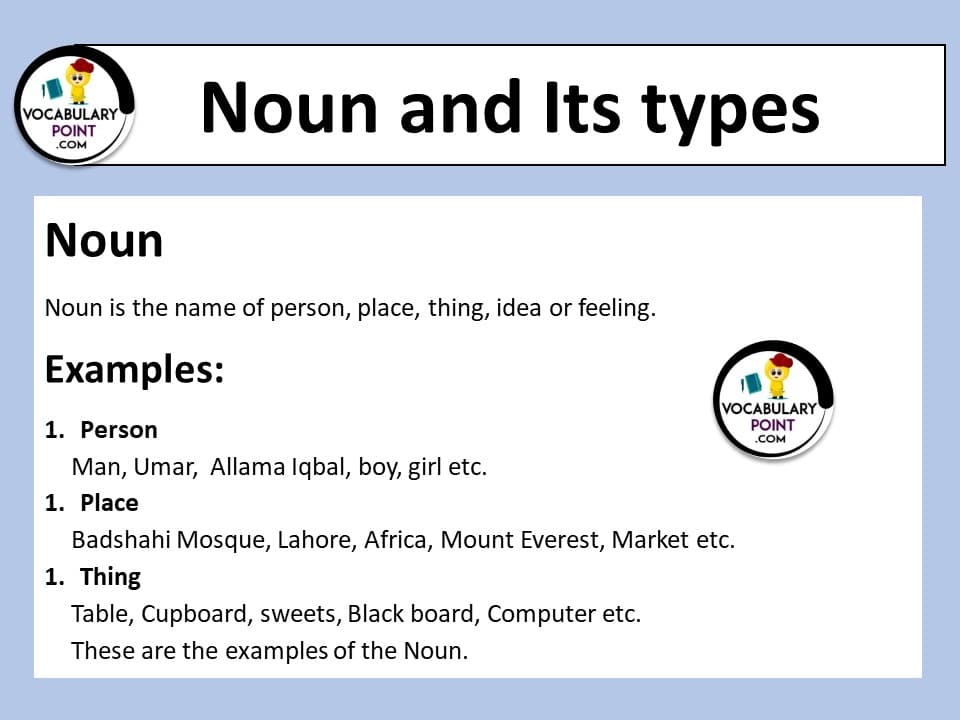
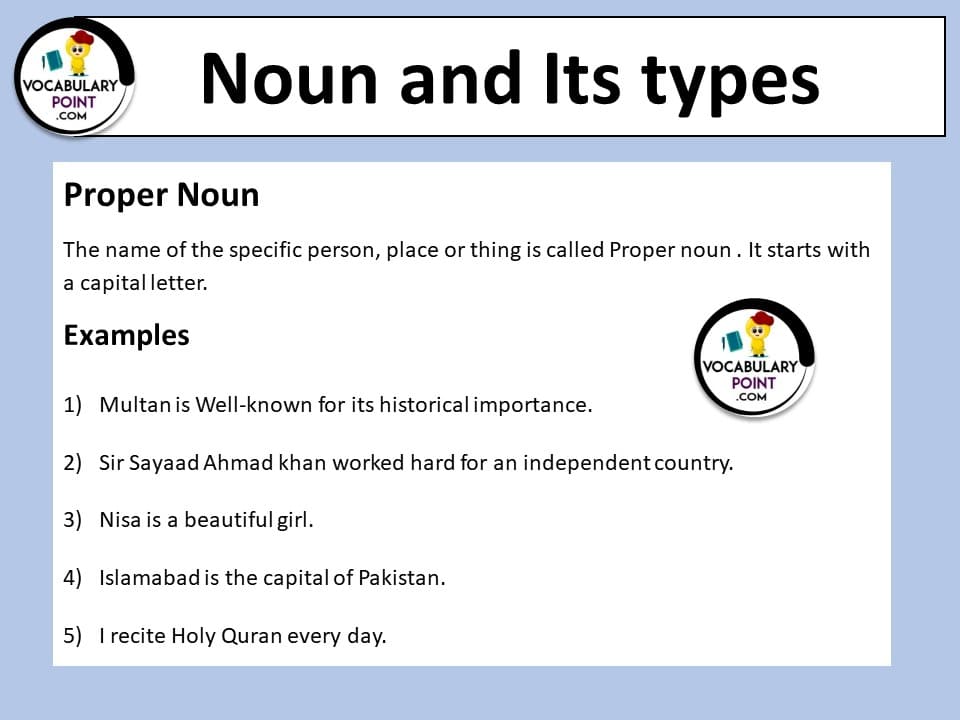
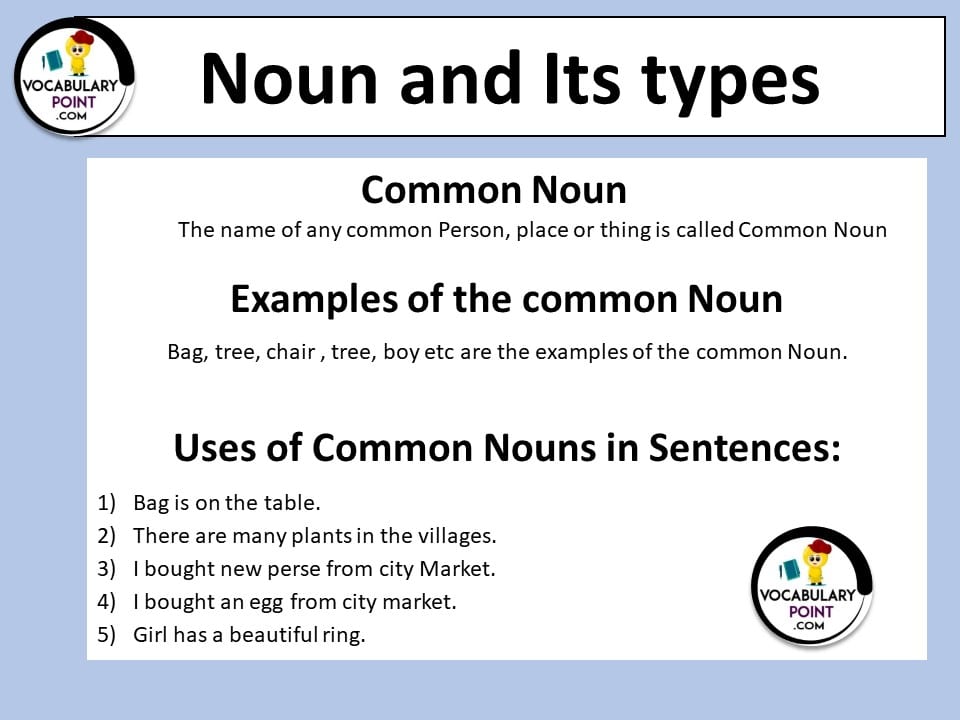
Download PDF
FAQs
-
What are the main types of nouns?
The main types include common nouns (e.g., “car”), proper nouns (e.g., “Toyota”), concrete nouns (e.g., “tree”), abstract nouns (e.g., “freedom”), collective nouns (e.g., “flock”), and compound nouns (e.g., “toothpaste”).
-
Can you give examples of common nouns?
Yes, “teacher,” “city,” and “book” are common nouns.
-
What are proper nouns?
Proper nouns are specific names given to particular nouns, like “Michael,” “New York,” or “The Great Wall of China.”
-
What are concrete nouns?
Concrete nouns are things that you can experience with your senses, such as “apple,” “dog,” or “building.”
-
What are abstract nouns?
Abstract nouns represent ideas or concepts that are not tangible, like “love,” “time,” or “justice.”
-
What is a collective noun?
A collective noun refers to a group of things or people, such as “team” or “herd.”
-
Can you provide examples of compound nouns?
Compound nouns are nouns made up of two or more words, like “swimming pool,” “firefighter,” or “sunflower.”
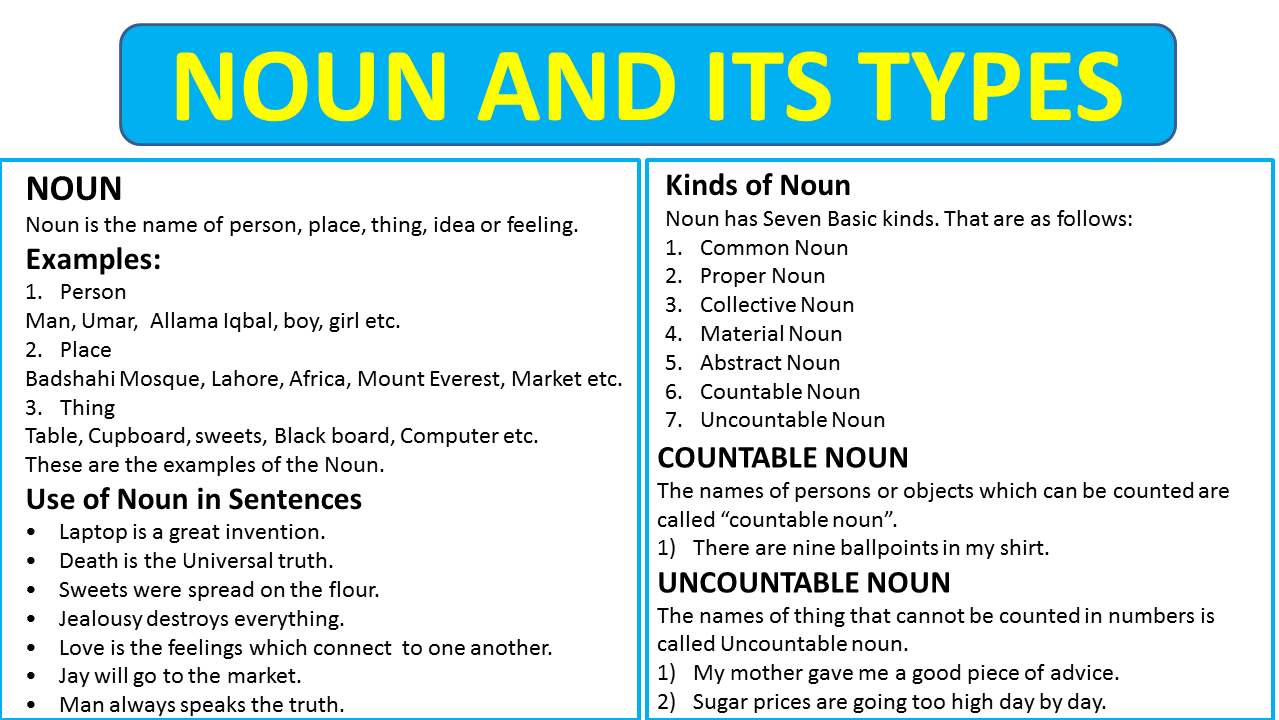
I am from Ethiopia. I am an English Teacher!
Thank you so much